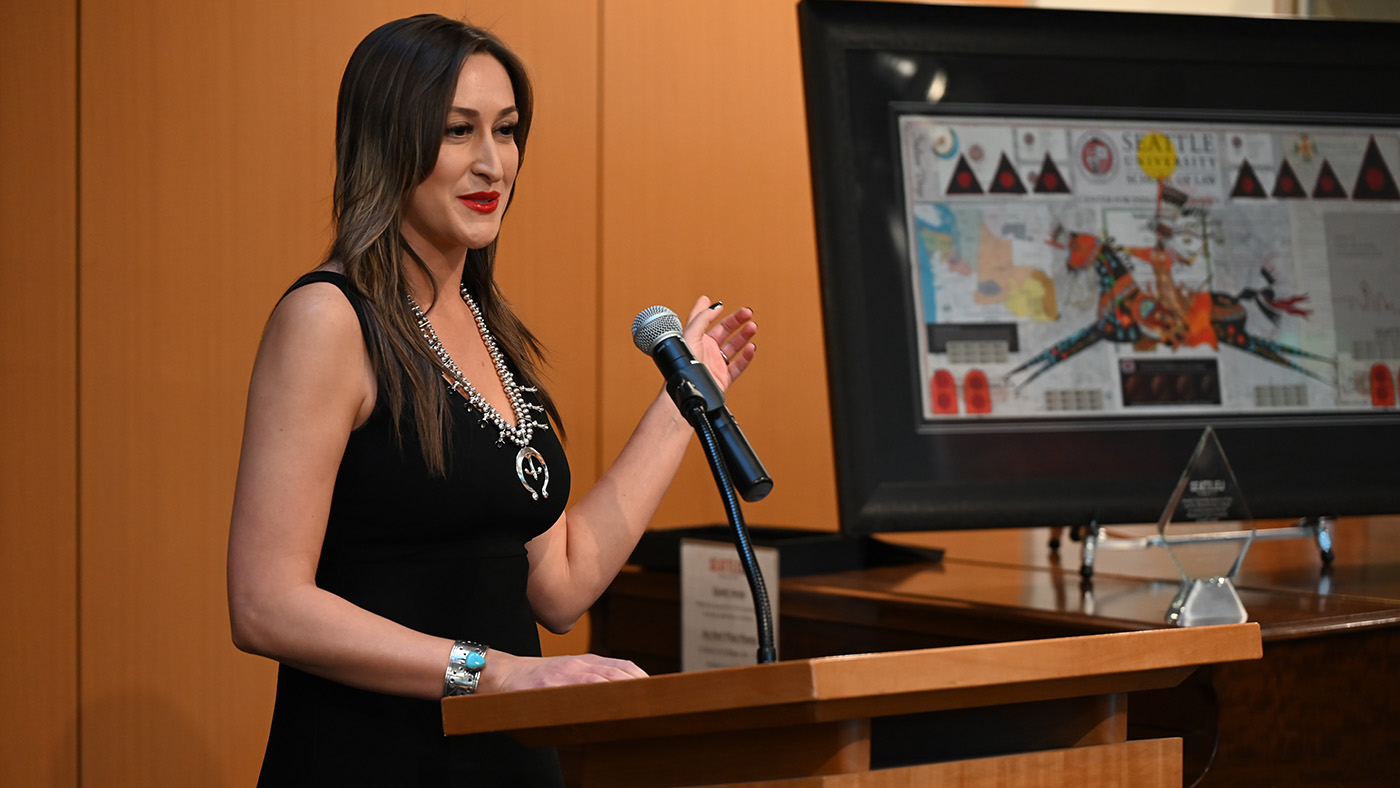When Bree Black Horse ’13 stepped to the podium to receive the 2024 Woman of the Year Award on Thursday evening, presented by Seattle University School of Law, the Womxn’s Law Caucus, and the Womxn of Color Coalition, she recognized another woman who lived 200 years ago.
That woman was Running Eagle of the Blackfeet Nation, who as a teenager pushed past the boundaries placed on women of her day by becoming a warrior — a role traditionally held by Blackfeet men — and devoting her life to protecting her people.
“Running Eagle was my role model growing up,” said Black Horse, an assistant United States attorney at the U.S. Attorney’s Office for the Eastern District of Washington, who is also an enrolled member of the Seminole Nation of Oklahoma. “I hope that you will be inspired by the example she set with her bold spirit, just leadership, and service to her community.”
A depiction of Running Eagle riding her horse into battle can be seen in “The Spirit of Justice,” a map collage donated to Seattle U Law’s American Indian Law Journal by Black Horse’s parents, Terrance Guardipee and Catherine Black Horse, in 2012. Guardipee created the piece, a form of ledger art, in honor of the professors, students, and advisors involved with the journal, which Bree Black Horse co-founded during her time at Seattle U Law.
“You are all currently in a room full of Running Eagles,” Black Horse told the audience. “There are so many women in this room who have dedicated themselves to serving their communities in leadership positions.”
Black Horse was recently named the first Missing and Murdered Indigenous Persons (MMIP) prosecutor for the U.S. Attorney’s Office for the Eastern District of Washington. This position is a central component of the U.S. Department of Justice’s (DOJ) new MMIP Regional Outreach Program, which provides specialized support to U.S. Attorney’s offices to address and combat MMIP issues. At Thursday’s event, Black Horse called this position “the highlight of my legal career.”
“For far too long, Indigenous men, women, and children have suffered violence at higher rates than other demographics,” she said. “This program provides experience and specialized reports to address unresolved homicides and MMIP-related crimes that are often precursors to MMIP cases, such as domestic violence, sexual assault, child abuse, and human trafficking.”
Black Horse has represented Native American interests, such as tribal sovereignty and treaty rights, both privately and publicly at the federal, state, and tribal levels. She was previously a senior associate at Kilpatrick Townsend & Stockton LLP. Black Horse also completed an internship with the Office of Tribal Justice at the DOJ in Washington, D.C. After graduation, she clerked for U.S. District Court Judge Brian M. Morris in the District of Montana. Last year, Black Horse served as president of the Washington State Bar Association’s Indian Law Section. In her time at Seattle U Law, she co-founded and served as editor of the American Indian Law Journal and was president of the Native American Law Student Association.
When presenting Black Horse with the Woman of the Year Award, Dean Anthony E. Varona called her a “world-changer and trailblazer.”
“We gather to celebrate the incredible progress made by women in the legal profession and in transforming the law, legal education, and law practice,” he said. “Tonight’s honoree stands proudly in a long line of women who have pushed forward our workplaces and our laws to a place of much greater equity.”
“I am humbled and honored to receive this award,” Black Horse said.
She offered advice inspired by Running Eagle’s example to the audience.
“Build relationships with other people in your warrior society for the purpose of serving your community, and those will be some of the most meaningful relationships you have,” she said. Additionally, “When you are called to lead, take that opportunity and serve your community.”
At the close of Black Horse’s speech, her parents, along with Port Gamble S’Klallam Tribal Chairwoman Amber Caldera, draped her in a traditional blanket.
“When you honor your loved ones and they’ve achieved something spectacular, you give them a blanket,” Guardipee explained, adding that the blanket represents a comforting embrace from loved ones.
At the close of the event, the Womxn’s Law Caucus and Womxn of Color Coalition presented the Kellye Testy Scholarship to Bree Zamora ’24. The two groups, along with the Black Law Student Association, also presented the G. Helen Whitener Scholarship to Inaara Ali ’26.

